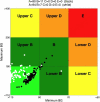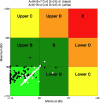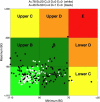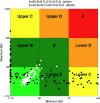Run-to-run tuning of model predictive control for type 1 diabetes subjects: in silico trial
- PMID: 20144422
- PMCID: PMC2769897
- DOI: 10.1177/193229680900300512
Run-to-run tuning of model predictive control for type 1 diabetes subjects: in silico trial
Abstract
Background: The technological advancements in subcutaneous continuous glucose monitoring and insulin pump delivery systems have paved the way to clinical testing of artificial pancreas devices. The experience derived by clinical trials poses technological challenges to the automatic control expert, the most notable being the large interpatient and intrapatient variability and the inherent uncertainty of patient information.
Methods: A new model predictive control (MPC) glucose control system is proposed. The starting point is an MPC algorithm applied in 20 type 1 diabetes mellitus (T1DM) subjects. Three main changes are introduced: individualization of the ARX model used for prediction; synthesis of the MPC law on top of the open-loop basal/bolus therapy; and a run-to-run approach for implementing day-by-day tuning of the algorithm. In order to individualize the ARX model, a sufficiently exciting insulin profile is imposed by splitting the premeal bolus into two smaller boluses (40% and 60%) injected 30 min before and 30 min after the meal.
Results: The proposed algorithm was tested on 100 virtual subjects extracted from an in silico T1DM population. The trial simulates 44 consecutive days, during which the patient receives breakfast, lunch, and dinner each day. For 10 days, meals are multiplied by a random variable uniformly distributed in [0.5, 1.5], while insulin delivery is based on nominal meals. Moreover, for 10 days, either a linear increase or decrease of insulin sensitivity (+/-25% of nominal value) is introduced.
Conclusions: The ARX model identification procedure offers an automatic tool for patient model individualization. The run-to-run approach is an effective way to auto-tune the aggressiveness of the closed-loop control law, is robust to meal variation, and is also capable of adapting the regulator to slow parameter variations, e.g., on insulin sensitivity.
2009 Diabetes Technology Society.
Figures






References
-
- Bequette BW. A critical assessment of algorithms and challenges in the development of a closed-loop artificial pancreas. Diabetes Technol Ther. 2005;7(1):28–47. - PubMed
-
- Hovorka R. Continuous glucose monitoring and closed-loop systems. Diabet Med. 2005;23(1):1–12. - PubMed
-
- Magni L, Raimondo DM, Allgower F. Vol. 384. Berlin: Springer; 2009. Nonlinear model predictive control: towards new challenging applications.
-
- Dua P, Doyle FJ, III, Pistikopoulos EN. Model-based blood glucose control for type 1 diabetes via parametric programming. IEEE Trans Biomed Eng. 2006;53(8):1478–1491. - PubMed
Publication types
MeSH terms
Substances
LinkOut - more resources
Full Text Sources
Other Literature Sources
Medical

